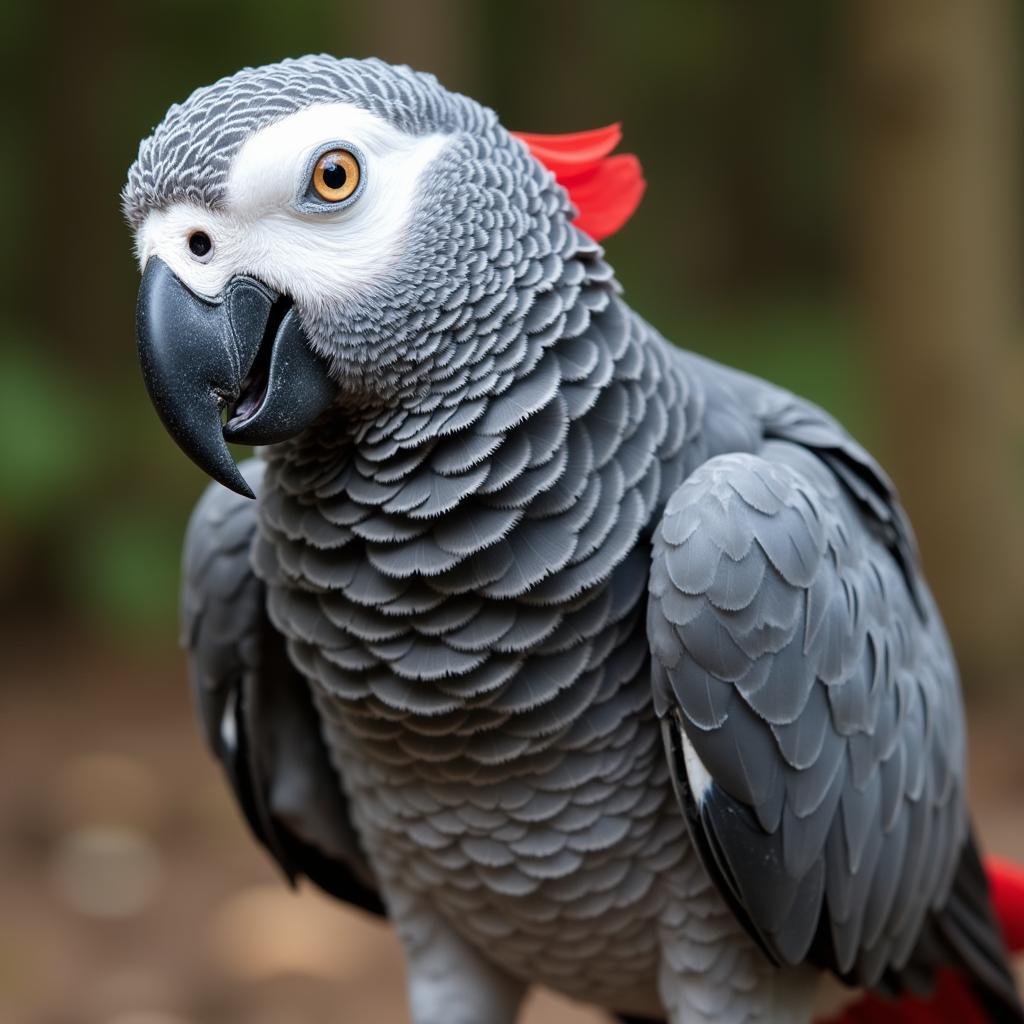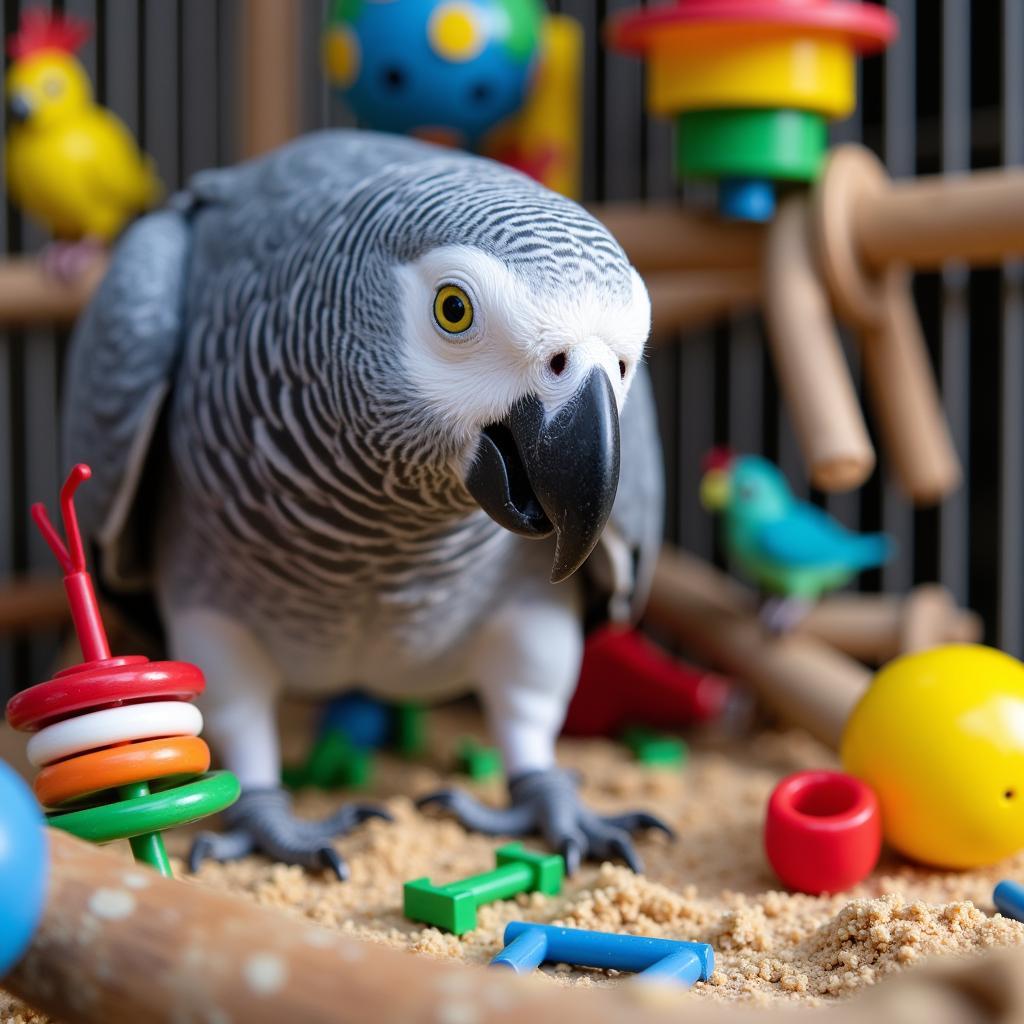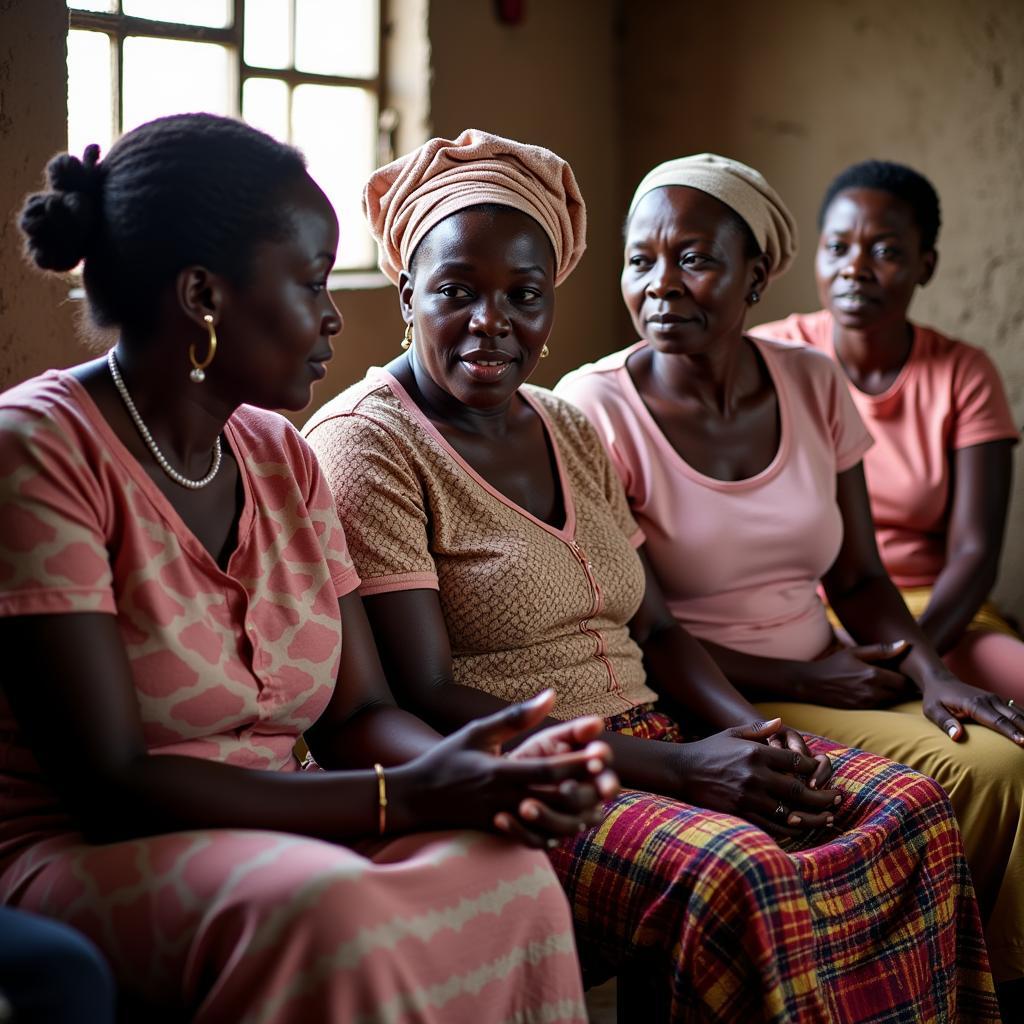African Grey Plucking Collar: Understanding and Addressing Feather Destructive Behavior
African Grey parrots, known for their intelligence and talking abilities, are captivating creatures that bring joy to countless homes. However, these sensitive birds can sometimes exhibit behaviors that are concerning for their owners, and feather destructive behavior, particularly plucking at the collar area, is one such issue. This behavior can be distressing for both the bird and their human companion. Understanding the underlying causes of collar plucking is crucial for addressing it effectively and ensuring the well-being of your feathered friend.
 African grey parrot plucking feathers around its neck
African grey parrot plucking feathers around its neck
Deciphering the Signals: Why Do African Greys Pluck their Collars?
Collar plucking in African Greys is rarely a result of a single factor. It’s often a complex interplay of various elements, some stemming from their environment and others rooted in their physical or emotional state.
- Environmental Stressors: Just like humans, African Greys are sensitive to their surroundings. A cramped cage, lack of enrichment, or an inconsistent routine can trigger stress, leading to feather plucking as a coping mechanism.
- Dietary Deficiencies: Nutrition plays a vital role in feather health. A diet lacking in essential vitamins, minerals, and amino acids can make feathers brittle and itchy, prompting the bird to pluck at them.
- Medical Reasons: Underlying medical conditions, such as parasites, skin allergies, or hormonal imbalances, can cause discomfort and itching, leading to feather plucking. It’s crucial to rule out any medical causes with a veterinarian experienced in avian care.
- Psychological Factors: African Greys are highly intelligent and emotional creatures. Boredom, loneliness, lack of mental stimulation, or even past trauma can manifest as feather destructive behavior.
Addressing Collar Plucking: A Multifaceted Approach
Successfully resolving collar plucking in African Greys requires a holistic approach that addresses both the potential physical and psychological factors contributing to the behavior.
1. Veterinary Consultation: The First Line of Defense
The first and most crucial step is to schedule a visit with an avian veterinarian. A thorough examination can help identify or rule out any underlying medical conditions that might be causing the plucking.
2. Environmental Enrichment: Creating a Stimulating Habitat
- Cage Size and Location: Ensure your African Grey’s cage is spacious enough to allow for comfortable movement and play. Place the cage in a well-lit area of the house with plenty of natural light, avoiding drafts and direct sunlight.
- Toys and Foraging Opportunities: Provide a variety of toys that challenge their intelligence, such as puzzle toys, foraging toys, and toys that encourage chewing. Rotate the toys regularly to prevent boredom.
- Social Interaction: African Greys are highly social creatures that thrive on interaction. Spend quality time with your bird daily, engaging in activities like talking, playing games, or simply being present in the same room.
 An assortment of toys for African grey parrots, including puzzle toys and foraging toys.
An assortment of toys for African grey parrots, including puzzle toys and foraging toys.
3. Dietary Adjustments: Nourishing Healthy Feathers
- Balanced Diet: Feed your African Grey a high-quality, pelleted diet specifically formulated for their species. Supplement this with fresh fruits, vegetables, and occasional healthy treats.
- Fresh Water: Always provide access to fresh, clean water for drinking and bathing.
4. Emotional Well-being: Nurturing a Strong Bond
- Positive Reinforcement: Focus on rewarding positive behaviors, such as playing with toys or interacting calmly, with praise, head scratches, or healthy treats.
- Avoid Punishment: Never yell at or punish your bird for plucking, as this can worsen their anxiety and exacerbate the behavior.
Seeking Professional Guidance: When to Consult an Avian Veterinarian or Behaviorist
While environmental and dietary adjustments can often help curb collar plucking, it’s essential to seek professional help if:
- The plucking is persistent or worsens despite your efforts.
- You notice any signs of skin irritation, bleeding, or self-mutilation.
- Your bird exhibits other behavioral changes, such as lethargy, loss of appetite, or aggression.
An avian veterinarian can rule out medical causes and recommend treatment if necessary. Additionally, consulting a certified parrot behaviorist can provide valuable insights and strategies for addressing the psychological aspects of feather plucking.
Remember, patience and consistency are key. Addressing collar plucking in African Greys is a journey that requires understanding, dedication, and a deep love for your feathered companion. By providing a nurturing environment, a balanced diet, and plenty of love and attention, you can help your African Grey thrive and enjoy a long, healthy, and happy life.
Frequently Asked Questions (FAQ)
1. Can collar plucking in African Greys be cured?
While there’s no guaranteed “cure” for collar plucking, with proper care, environmental enrichment, and veterinary attention, many birds can overcome this behavior and regrow their feathers.
2. Is it normal for African Greys to pluck a few feathers occasionally?
Occasional preening and removal of a few feathers is a natural part of a bird’s grooming routine. However, excessive plucking, especially in the collar area, is a cause for concern.
3. How long does it take for feathers to grow back after plucking?
Feather regrowth varies depending on the severity of the plucking and the bird’s overall health. It can take several months to a year for feathers to grow back completely.
4. Can I use a collar or restraint to stop my African Grey from plucking?
Collars and restraints are generally not recommended as they can cause further stress and discomfort to the bird. They also don’t address the underlying reasons for the behavior.
5. What are some signs that my African Grey might be experiencing stress or boredom?
Signs of stress or boredom in African Greys can include feather plucking, excessive screaming, biting, destructive behavior, and changes in appetite or activity levels.
Looking for more information about African Grey parrots? Check out our article about african lovebirds.
Need further assistance in understanding and caring for your African Grey? We are here to help! Contact us at Phone Number: +255768904061, Email: kaka.mag@gmail.com or visit our office at Mbarali DC Mawindi, Kangaga, Tanzania. Our dedicated team is available 24/7 to assist you with any concerns and provide expert advice.



